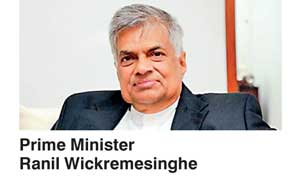Sunday Feb 22, 2026
Sunday Feb 22, 2026
Friday, 24 June 2016 00:31 - - {{hitsCtrl.values.hits}}
By Ashwin Hemmathagama – Our Lobby Correspondent
Bipartisan efforts launched in 2002 to introduce freedom of information laws finally succeeded yesterday after a space of nearly 15 years, with the Unity Government moving the Right To Information Bill in Parliament in a bid to increase public access to information on state affairs and shed spotlights on corruption and losses. 
The Government is fulfilling a major campaign promise with the introduction of the draft legislation with a vote on the bill expected to take place today.
Prime Minister Ranil Wickremesinghe leading the historical moment urged fellow parliamentarians to pass the RTI Bill to uphold what he called the “basic principles of democracy and peoples’ sovereignty by providing them access to information,” which had been unavailable under Rajapaksa regime.
“The Right to Information bill was first presented in Parliament in 2003. But with the change of the United National Party government in the 2004 general election, the new Government didn’t pursue the RTI matter. We missed the opportunity to be the first country in South Asia to pass a RTI Bill,” the Premier said, kicking off the debate.
He said that the Government disregarded constant appeals by the opposition in Parliament from 2004-2015 to introduce right to information laws. “The UPFA Government held it was not required and not the time,” Prime Minister Wickremesinghe revealed. Similar requests for right to information laws made by civil society had also been rejected, preventing the people’s right to know of matters of state during the tenure of the previous Government.
“Our Government believes right to information is important to the people and is part of the sovereignty they hold. This Unity Government was able to establish many things which were not there before. Please support this bill. We will pass this bill tomorrow,” he pledged.
According to the Premier, shady transactions that took place during the previous regime could have been prevented to some extent if RTI legislation was in place.
“Until recent times nobody knew about these corrupt shady transactions. Large amounts of public monies got wasted. The country borrowed heavily. If access to information was available, the situation might have been different,” Wickremesinghe claimed.
Right to Information legislation would ensure that no Government can conceal information, the Prime Minister noted. Parliamentary Select Committees and ordinary citizens could use the laws that the Government hopes to enact today to access information about state matters, he said.
With the two-day debate coming to an end with a vote on the RTI bill today, the Government will face the uphill challenge of establishing 4,000 offices island wide to serve RTI matters. These offices will be manned by a force of 8,000 – 12,000 trained personnel known as Public Information Officers. The Government has pledged to complete training for the Public Information Officers within the period of a year.